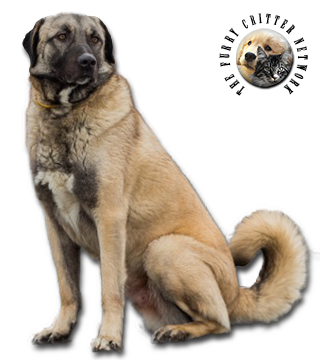Breed Standard
Head: Strong and broad. Slightly domed skull. Slight stop. Muzzle is slightly shorter than the skull. Black lips.
Ears: Medium size, drop, triangular with rounded tips.
Eyes: Small. Golden to brown color depending on coat color.
Body: Powerful. Thick, muscular neck. Deep chest. Belly well tucked up. Chest well-down. Ribs well sprung.
Tail: Long, carried low and slightly curled.
Hair: Thick, short or moderately long. Thick undercoat. Longer on the neck, shoulders, and thighs.
Coat: All colors permissible. Preferred colors are tawny and fawn with black mask and ears.
Size: Dog: 74 to 81 cm. (29-32 in).Bitch: 71 to 79 cm. (28-31 in).
Weight: Dog: 50 to 65 kg. (110.5-144.5 lb).Bitch: 40 to 55 kg. (88-121.5 lb).
History
Descended from molossus of Asian origin, the Anatolian Shepherd Dog's roots can be traced to the high plateaus and mountains of Turkey. This breed was used to guard sheep and protect them from predators, such as wolves. The Anatolian Shepherd Dog is also used as a hunting dog and army dog.
Behavior
His habit of living and working outdoors in all weather conditions and his rugged past make this a sturdy, hardy breed. The Anatolian Shepherd Dog has a strong personality and is often stubborn and requires an owner with an alpha personality. While he is loyal and gentle with his owner and children, this dog is very distrustful of strangers, making him a superb guard dog.
The thick double coat that is somewhat wiry, and needs to be brushed 1-2 times a week in warm weather due to excessive shedding. Anatolian Shepherds are not recommended for apartment life. They are relatively inactive indoors and will do best with at least a large yard. This breed is very suspicious of strangers, and it is therefore necessary to provide a secure, fenced yard.
Function
Gaurd Dog, Pet
Health
Prone to hypothyroidism or to eyelid entropion. Hip dysplasia does occur, but is not as common as in some other large breeds. They are sensitive to anesthesia. The Anatolian Shepherd's immunity often takes longer to develop than with many other breeds and therefore you should talk to your vet about giving young Anatolians extra vaccinations against Parvo-virus.






